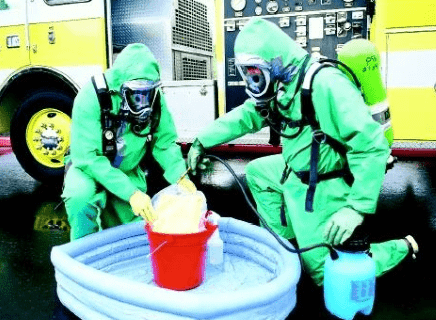COURSE OVERVIEW
HE1130 : NEBOSH HSE Certificate in Process Safety Management (PSM)

OVERVIEW
| COURSE TITLE | : | HE1130 : NEBOSH HSE Certificate in Process Safety Management (PSM) |
| COURSE DATE | : | Nov 18 - Nov 22 2024 |
| DURATION | : | 5 Days |
| INSTRUCTOR | : | Mr. Shehab Kamel |
| VENUE | : | Dubai, UAE |
| COURSE FEE | : | $ 5500 |
| Request For Course | ||
Course Description
This practical and highly-interactive course includes real-life case studies and exercises where participants will be engaged in a series of interactive small groups and class workshops.
The NEBOSH HSE Certificate in Process Safety Management qualification is designed to provide a sound breadth of knowledge and understanding that enables qualification holders to contribute to the management of process safety risks. This qualification builds on the understanding already gained by studying the NEBOSH National or International General Certificate in Occupational Health and Safety.
This qualification aims to provide holders with the knowledge and understanding of Process Safety Management to ensure that they can contribute to the effective management of process safety risks. When things go wrong in the process industry the results can be catastrophic. This has been evidenced by incidents in the past which have led to loss of life and many billions of US dollars’ worth of damages. The Deepwater Horizon incident which tragically led to 11 people losing their lives and the total cost to BP was in the region of $62 billion.
The process safety industry is high hazard so having qualified people to manage activities within the industry will lead to safer workplaces. This will help to prevent loss of life but will also help to protect valuable assets and helps organizations avoid prosecution and ultimately loss of reputation.
This course is designed to provide participants with a detailed and up-to-date overview of NEBOSH process safety management. It covers the meaning of process safety and how it differs from personal safety; the role of leadership in process safety management, the purpose of organizational learning; the benefits, limitations, types of worker participation and engagement; the purpose and importance of establishing a process safety management system and its key elements; the common risk management techniques used in process industries; asset management and maintenance strategies for process plant; and the role, purpose and features of a permit-to-work, the key principles of safe shift handover and the principles of selecting, assessing and managing contractors.
Further, the course will also discuss the purpose and requirements of standard operating procedures; the controls that shall be adopted to control the safe start-up and shutdown of process plant including the necessity for performance standards for safety critical systems, equipment and the concept of ‘FARSI’; the hazards and controls associated with the use of steam and water as well as electricity/static electricity within the process industries; the physical forms of dangerous substances and how these can determine process risk; and the hazards presented by chemical reactions and the protective measures used to mitigate the consequences of a thermal runaway reaction including the hazards and controls available for the bulk storage of dangerous substances.
During this interactive course, participants will learn the fire and explosion hazards relating to process industries; the appropriate control measures to minimize the effects of fire and explosion in the process industries; how dusts have the potential to explode; the commonly used control measures adopted to prevent and minimize explosion; and the purpose and features of an emergency plan and the requirements for the implementation.
The syllabus consists of one unit (Unit PSM1) that is divided into four elements. The Unit is a taught unit assessed by 90 minutes written examination. The examination consists of 40 multiple-choice questions. All questions are compulsory. Candidate scripts are marked by external examiners appointed by NEBOSH.
TRAINING METHODOLOGY
This interactive training course includes the following training methodologies:
LecturesWorkshops & Work Presentations
Case Studies & Practical Exercises
Videos, Software & Simulators
In an unlikely event, the course instructor may modify the above training methodology for technical reasons.
VIRTUAL TRAINING (IF APPLICABLE)
If this course is delivered online as a Virtual Training, the following limitations will be applicable:
| Certificates | : | Only soft copy certificates will be issued |
| Training Materials | : | Only soft copy materials will be issued |
| Training Methodology | : | 80% theory, 20% practical |
| Training Program | : | 4 hours per day, from 09:30 to 13:30 |
RELATED COURSES

HE0913 : Certified Occupational Health, Safety & Industrial Hygiene
- Date: Jan 26 - Jan 30 / 3 Days
- Location: Istanbul, Turkey
- Course Details Register

HE1022 : Introduction to Process Safety Management (PSM)
- Date: Jan 26 - Jan 30 / 3 Days
- Location: Doha, Qatar
- Course Details Register

HE0240 : Certified Safety Auditing, Hazard Identification & Site Inspection: Safety Inspector Qualification
- Date: Jan 26 - Jan 30 / 3 Days
- Location: Dubai, UAE
- Course Details Register

HE0127 : Industrial Hygiene Certification Program W507: Health Effects of Hazardous Substances (Accredited by OHTA-BOHS)
- Date: Jan 26 - Jan 30 / 3 Days
- Location: Doha, Qatar
- Course Details Register
